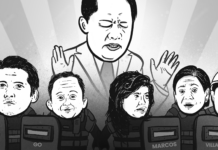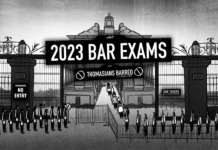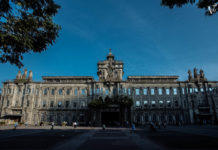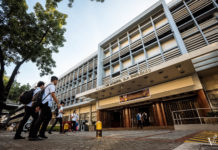FILIPINO Catholics may celebrate what they brag to be the longest Christmas holidays in the world, but they seem averse to the worldwide persecution of Christians, especially those right in Asia Minor where Christ was born.
In the Middle East, a Christian dies every five minutes, according to a report by the Catholic News Agency. Vatican analyst and journalist John Allen wrote that 11 Christians are killed per hour, per day, for the last 10 years. The situation has since escalated due to the increasing Islamic extremism in the area.
Early this year, the Islamic State of Iraq and Syria (ISIS) released a video showing the beheading of 21 Coptic Christians in Libya for the express reason of practicing the Christian faith. The video caused uproar around the world, prompting the United Nations Security Council to particularly address the issue.
Pope Francis later on described the massacre as a “testimony that cries out” and that everyone is a brother in the Christian faith—may it be Catholic, Coptic, or Orthodox among others.
The European refugee crisis owes to Christians and Arabs displaced by the Islamic State campaigns in the Levant. Ancient Eastern Christian churches, many of them with ties to the Catholic Church in Rome, have felt the brunt of the Isis campaigns as whole populations of them have been killed, evicted, pillaged. Christian hierarchs and patriarchs have expressed wish for the Christian communities to remain, but they said they cannot stop them because to do so would expose them to genocide. So they’re trying to assist them to seek safer havens in Kurdish Iraq or elsewhere. They want Europe and the US to give the refugees visas but only Germany seems welcoming.
Elsewhere in the world, Christians face persecutions especially in Christians where they are a minority or where the regimes are outrightly atheistic and hostile to any religion.
Some, 200 million Christians in over 60 countries around the world face some degree of restriction, discrimination or outright persecution, according to the Guardian of England
In Asia, North Korea is considered as the most dangerous place for Christians, according to the 2015 Open Doors World Watch list. Christians in North Korea are often sent to prison camps for possessing Bibles and are prohibited from practicing their faith. A Washington Post article last September said an estimated 12,000 Christians are imprisoned in North Korea.
Other countries, such as China, are also strengthening their non-tolerance of the Christian faith. In 2014 alone, Christian human rights organization China Aid has documented 572 cases of religious persecution, wherein 17,884 Christian believers were affected, 1,592 of which were leaders of the Catholic Church.
Crosses were removed and church buildings were demolished as a response to the Chinese government’s efforts of a “crackdown on cult activities” since the official religion of the Chinese Communist Party is atheism.
Chinese authorities continued to harass and restrict Catholics who practice their faith outside of state-approved parameters. Among the victims of harassment are two Catholic priests who were detained for conducting “adult catechism classes,” the Catholic News Agency has reported.
Meanwhile, in Somalia, Christian celebrations and conversion to the Christian faith are illegal after the Ministry of Justice and Religious Affairs prohibited Christian activities in 2013.
Government efforts to protect religious freedom are also not enough to curb the worsening persecution of Christians.
In Egypt, for instance, Christians continue to suffer mob violence from their Muslim neighbors who are not even part of any extremist group. This continues despite the Egyptian government’s appeal for “goodwill” in the community.
While many Christian Filipinos are busy wrapping presents, preparing for parties and singing carols, their fellow Christians in other countries with very unwelcoming regimes to Christianity are searching for freedom and safety with the profession of the Christian faith.
In his homily in Bangui, Central African Republic last November 29, Pope Francis stressed the need for a “spirit of communion” amid injustice, persecutions, terrorism attacks and clashes of beliefs all around the world.
For most people, Christmas is supposedly the “most wonderful time of the year” but for many brothers and sisters, this season becomes a reminder of the faith that they cannot freely exercise.
“In every place, even and especially in those places where violence, hatred, injustice and persecution hold sway, Christians are called to give witness to this God who is love,” the Holy Father said.
Lives are in danger for the free exercise of religion, a fundamental right violated by radicals who believe that violence is the will of their god and the road to salvation.
More often than not, most Christians do not realize the far cry for justice and peace of persecuted Christians around the world, like in the Philippines where there are laws that guarantee religious freedom.
The persecution suffered by Christians in hostile countries may also seem abstract and not alarming to those who are shielded away from it.
As a predominantly Catholic country, the Philippines cannot ignore the plight of its fellow Christians abroad. And even if the Philippines weren’t predominantly Christian, its government has the duty to uphold freedom of religion and make all countries that have signed the relevant international conventions on that matter to uphold it and provide protection to Christian minorities or any minority for that matter, irrespective of any religion.
One man’s call to uphold religious freedom may seem too small for religious extremists and hostile countries but as one Church, the call will serve as an assertion that Christians around the world are ready to stand for their faith.
It is difficult to empathize when half of the world does not experience the pain and sufferings of persecuted Christians, especially if what they are experiencing is the opposite—a festive mood of the Christmas season.
Let us not be swayed by bright lights, comic relief, and the false joy that come along with the luxuries of the season. Beyond the glitter and the glamour is the underlying message of Christmas, the hope and love that is Christ.
The least we could do is give a moment of prayer for our persecuted brothers and sisters, in the hope that someday, they may also celebrate with us in joy during this special season, in which we remember the birth of our Savior—whom we also trust to save those who are in need the most.















